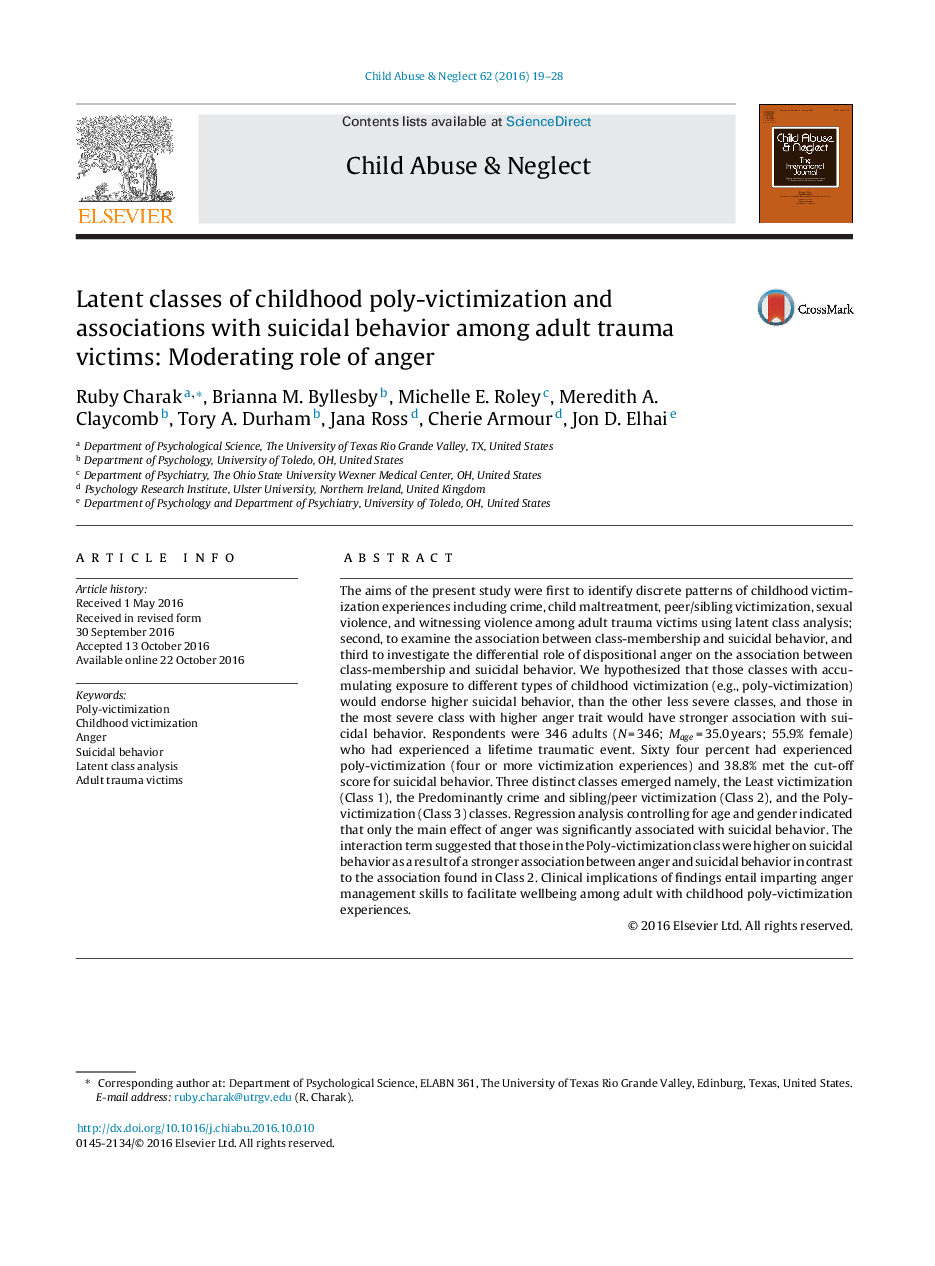| کد مقاله | کد نشریه | سال انتشار | مقاله انگلیسی | نسخه تمام متن |
|---|---|---|---|---|
| 4936150 | 1434366 | 2016 | 10 صفحه PDF | دانلود رایگان |
عنوان انگلیسی مقاله ISI
Latent classes of childhood poly-victimization and associations with suicidal behavior among adult trauma victims: Moderating role of anger
ترجمه فارسی عنوان
کلاس های پنهان از قربانی شدن در دوران کودکی و ارتباط با رفتار خودکشی در قربانیان آسیب های تروما: مدیر نقش خشم
دانلود مقاله + سفارش ترجمه
دانلود مقاله ISI انگلیسی
رایگان برای ایرانیان
کلمات کلیدی
پلی قربانی، قربانی کردن کودکی، خشم، رفتار خودکشی، تجزیه و تحلیل کلاس خوش آمدید، قربانیان تروما بزرگسالان،
موضوعات مرتبط
علوم پزشکی و سلامت
پزشکی و دندانپزشکی
پریناتولوژی (پزشکی مادر و جنین)، طب اطفال و بهداشت کودک
چکیده انگلیسی
The aims of the present study were first to identify discrete patterns of childhood victimization experiences including crime, child maltreatment, peer/sibling victimization, sexual violence, and witnessing violence among adult trauma victims using latent class analysis; second, to examine the association between class-membership and suicidal behavior, and third to investigate the differential role of dispositional anger on the association between class-membership and suicidal behavior. We hypothesized that those classes with accumulating exposure to different types of childhood victimization (e.g., poly-victimization) would endorse higher suicidal behavior, than the other less severe classes, and those in the most severe class with higher anger trait would have stronger association with suicidal behavior. Respondents were 346 adults (N = 346; Mage = 35.0 years; 55.9% female) who had experienced a lifetime traumatic event. Sixty four percent had experienced poly-victimization (four or more victimization experiences) and 38.8% met the cut-off score for suicidal behavior. Three distinct classes emerged namely, the Least victimization (Class 1), the Predominantly crime and sibling/peer victimization (Class 2), and the Poly-victimization (Class 3) classes. Regression analysis controlling for age and gender indicated that only the main effect of anger was significantly associated with suicidal behavior. The interaction term suggested that those in the Poly-victimization class were higher on suicidal behavior as a result of a stronger association between anger and suicidal behavior in contrast to the association found in Class 2. Clinical implications of findings entail imparting anger management skills to facilitate wellbeing among adult with childhood poly-victimization experiences.
ناشر
Database: Elsevier - ScienceDirect (ساینس دایرکت)
Journal: Child Abuse & Neglect - Volume 62, December 2016, Pages 19-28
Journal: Child Abuse & Neglect - Volume 62, December 2016, Pages 19-28
نویسندگان
Ruby Charak, Brianna M. Byllesby, Michelle E. Roley, Meredith A. Claycomb, Tory A. Durham, Jana Ross, Cherie Armour, Jon D. Elhai,
